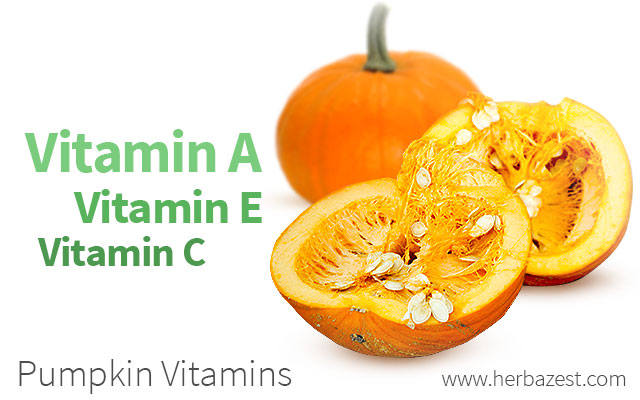Pumpkins are an excellent source of nutrition, and they can offer major health benefits when combined with exercise and a proper diet. The three main vitamins in pumpkin, each with their own unique health benefits, are vitamins A, C, and E, which work together to promote healthy skin, strengthen the immune system, and protect the heart. Read on to learn more about the vitamins in pumpkin!
Vitamins in Pumpkin
Pumpkins get their distinctive coloring from plant carotenoids. Carotenes in pumpkin result in the production of vitamin A (retinol), a fat-soluble vitamin that is responsible for maintaining healthy vision by helping the eyes to adjust to darkness after being in light. Vitamin A is also important for promoting healthy skin and cells and supporting the immune system.
Additionally, vitamin E is also fat-soluble and boasts antioxidant properties that help boost the immune system. Vitamin E widens blood vessels to prevent clotting and is central to cellular communication.
Finally, vitamin C (ascorbic acid), is an antioxidant that protects the body from the harmful effects of cell-damaging free radicals, and it is necessary for the production of collagen, which allows the skin to repair itself from damage.
How to Make the Most of Pumpkin's Vitamins
Since vitamins A and E are fat-soluble, it may be beneficial to prepare pumpkin with just a bit of healthy fat, such as extra virgin olive oil or alongside a lightly-dressed salad, to enjoy the abundant antioxidant qualities.
Some studies have shown that the pulp and rind of the pumpkin have a much higher vitamin C content than just the seeds alone.
Pumpkin's Vitamins and Daily Requirements
The average daily recommended intake of vitamin C is roughly 90 mg for men and 75 mg for women.1 Although pumpkin seeds are not a significant source of vitamin A themselves, both raw and cooked pumpkin will yield over three times the recommended vitamin A per 100 g serving, while the same portion size will yield about 5 - 6% of the recommended daily vitamin C and E intake.2
Vitamins in Pumpkin vs. Other Vegetables
Vitamin A, commonly found in dairy, certain fish oils, and dark, leafy vegetables, is highly prevalent in pumpkin, with an estimated concentration of nearly 780 micrograms per 100 g serving in canned pumpkin; that is almost twice as much vitamin A as a similar portion of raw, leafy spinach.3
Some nuts and plant oils are naturally rich in vitamin E, and while not as high as it is in nuts like almonds and hazelnuts, vitamin E content in pumpkin still rivals spinach and certain other dark green, leafy vegetables. Citrusy fruits and veggies like oranges , camu camu, and lemons hold the most significant amounts of vitamin C, but raw pumpkins still provide about 9 mg per 100 g serving.2
Pumpkin, with its large store of vitamins and minerals, is a heart-healthy super crop that pairs well with many other fruits and vegetables and may be used as the base for a variety of different casseroles, salads, and desserts. Antioxidants, minerals, and vitamins in pumpkins make them ideal for protecting the heart, boosting the immune system, repairing the skin, and supporting healthy vision.
Sources
- European Food Research & Technology, Variability of vitamin E content in pumpkin seeds (Cucurbita pepo L), 1996
- National Institutes of Health, Vitamin C: Health Professional Fact Sheet
- USDA Nutrient Database, Pumpkin, cooked, boiled, drained, without salt
- Power Foods, pp. 25, 57, 358, 371
Footnotes:
- National Institutes of Health. (n.d.). Vitamin C. Retrieved October 26, 2021 from https://ods.od.nih.gov/factsheets/VitaminC-Consumer/
- USDA. (2019). Pumpkin, raw. Retrieved October 26, 2021 from https://fdc.nal.usda.gov/fdc-app.html#/food-details/168448/nutrients
- USDA. (2019). Pumpkin, canned, without salt. Retrieved October 26, 2021 from https://fdc.nal.usda.gov/fdc-app.html#/food-details/168450/nutrients




